Young Woman's Family Is Moving To A Smaller Home And They Are Pushing Her Into Rehoming Her Dog, Claiming They’ve All Made Sacrifices
Whenever pet owners are moving homes, pets are always a number one consideration. While searching for their new home, they have to ask questions like, "Will the new place allow pets?" and "Will the new place have enough space for pets?"
These are critical questions to ask if you want to ensure that you and your pets are comfortable enough in your new home. Because, of course, if you really love your pets, you'd be hesitant to give them up just because you have to move.
Many people would even go to great lengths to find their new home just to make sure it meets all their pets' needs. But, of course, there are times when moving with your pet is just difficult.
For Redditor chyulip, there were a lot of issues coming from her brother about her taking her dog along with her to their new home. They were already leaving behind two dogs, but she didn't want to leave the puppy she adopted behind.
However, according to her brother, the dog would take too much work in their new home, and he thinks his sister should rehome it. On the other hand, the sister also has plenty of counterarguments for her brother's reasons.
Here's the whole story.
OP asks:

The family was set to move into a smaller house than their old family house, so everyone wanted to go minimal with what they were taking along.

They have three dogs, one of which is the sister's personally adopted puppy.
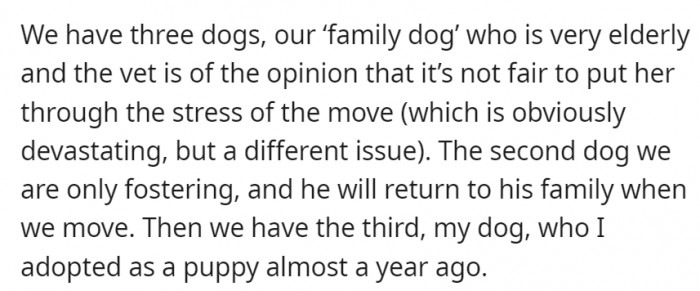
The Emotional Toll of Rehoming Pets
The pressure to rehome a beloved pet can have profound emotional implications, especially for families facing significant life changes. Research in animal-human relationships highlights that pets often serve as emotional support systems, providing comfort and stability during stressful times. The emotional bond between the young woman and her dog suggests that rehoming her pet would not only impact her but could also trigger feelings of loss and grief, similar to losing a family member.
Understanding this emotional context is crucial when discussing the potential rehoming of pets.
OP's brother thinks she should leave her puppy behind for various reasons.

Most of his reasons are because he thinks the dog just won't fit into their new home with its needs and everything.

But one of the biggest reasons is that they'd all had to sacrifice something in the move.

Moreover, the concept of attachment theory is particularly relevant in this context. Studies show that our attachments to pets can mirror those we form with family members, suggesting that the emotional fallout from rehoming can be significant. The young woman’s resistance to rehoming her dog likely reflects a deep-seated attachment that deserves consideration in family discussions.
Research emphasizes that acknowledging these emotional ties can facilitate more compassionate conversations about pet care and family dynamics.
The thing is, they'd all be living together only for the next six months since both brother and sister are also moving out by then.

Now, OP is genuinely confused about whether she's the one in the wrong here.
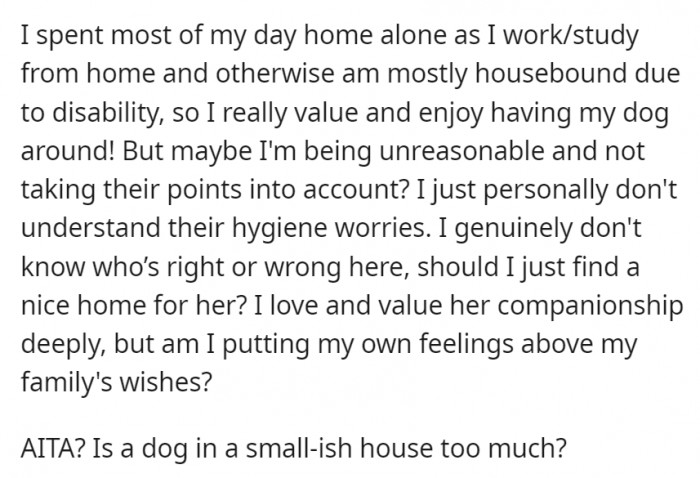
As OP said, she values and really enjoys her time with her dog, given that she's mostly housebound because of her disability. And no matter her brother's reasoning, OP's counterarguments also make a lot of sense.
After all, it's hard to part with a pup that just makes your day a lot better, right? Many people in the comments section also seem to think that OP is making all the right points for keeping her dog, and many are encouraging her to be firm in her decision.
Here are some of the top comments.
1. Either rehome the brother or move into her own place a lot sooner.
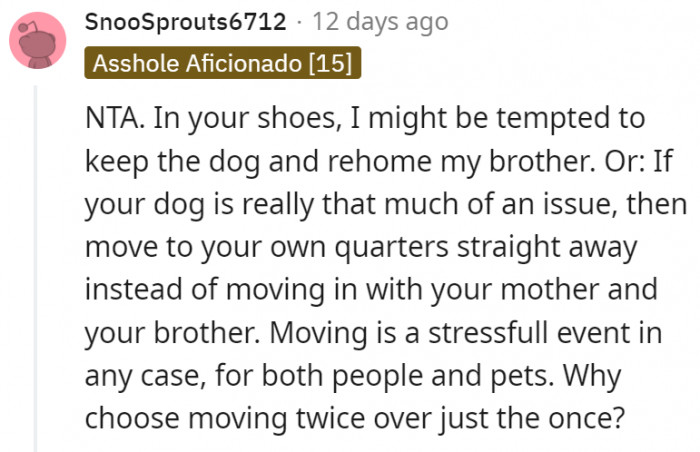
Effective Communication and Compromise in Families
When facing the prospect of rehoming a pet, effective communication is essential for family members to express their feelings and concerns. Research in family psychology indicates that open discussions can lead to more empathetic and understanding outcomes. Encouraging each family member to share their perspective can help the young woman feel heard while also allowing others to express their needs.
Incorporating family meetings to discuss pet care responsibilities can foster a sense of unity and shared responsibility among family members.
2. It's absurd how the brother compared the dog, a living, breathing creature, to a lifeless hunk of metal.
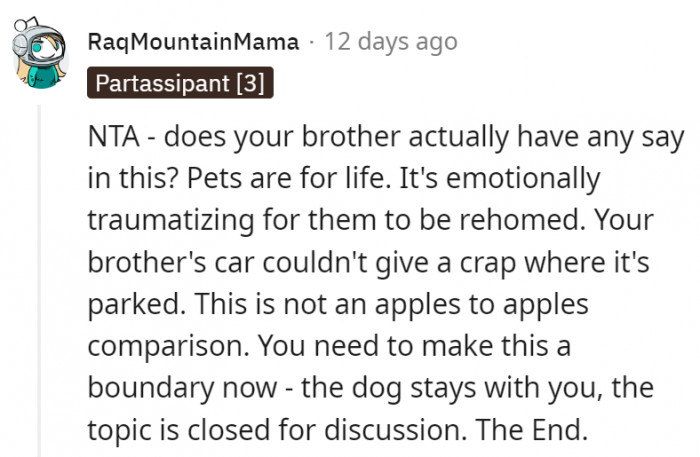
3. The dog is family, and it's for life.
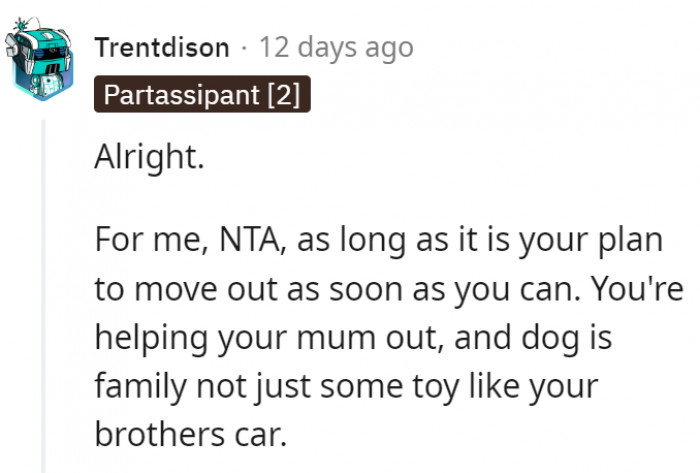
4. The dog is literally her best friend.

Encouraging compromise can also play a vital role in resolving these conflicts. Research suggests that families who engage in problem-solving discussions tend to find solutions that respect everyone's emotional needs. For example, exploring alternatives to rehoming, such as shared caregiving responsibilities or seeking outside help for the pet, can create a win-win situation.
Approaching the situation collaboratively can enhance family relationships while ensuring that everyone's feelings are considered.
5. Plus, it's not the brother's house, and he's not even staying in it for life with the dog.

6. OP does make sure that her dog is well taken care of despite her disability.

If absolutely need be, though, this person recommends rehoming her dog.

7. This person understands OP's reasons but still has some questions.
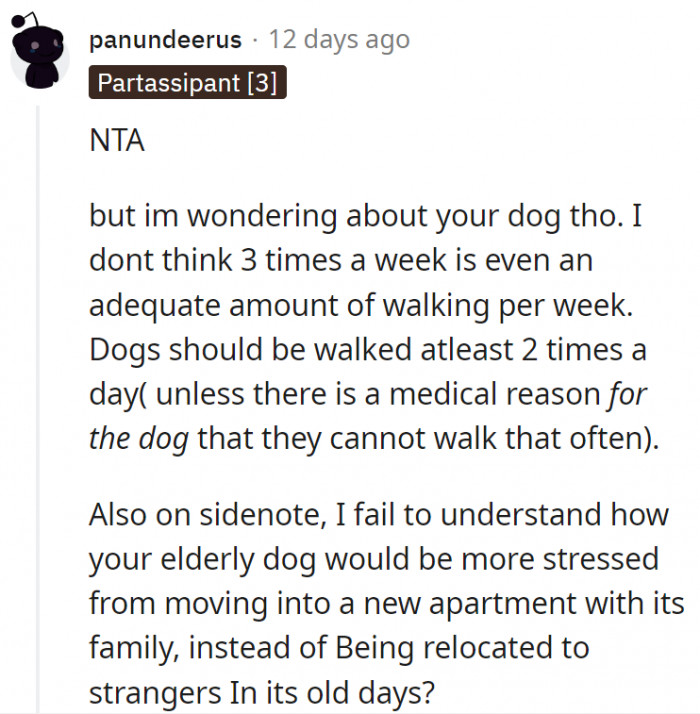
OP assured them, though, that her dog has an outdoor garden to play in when not getting walks.
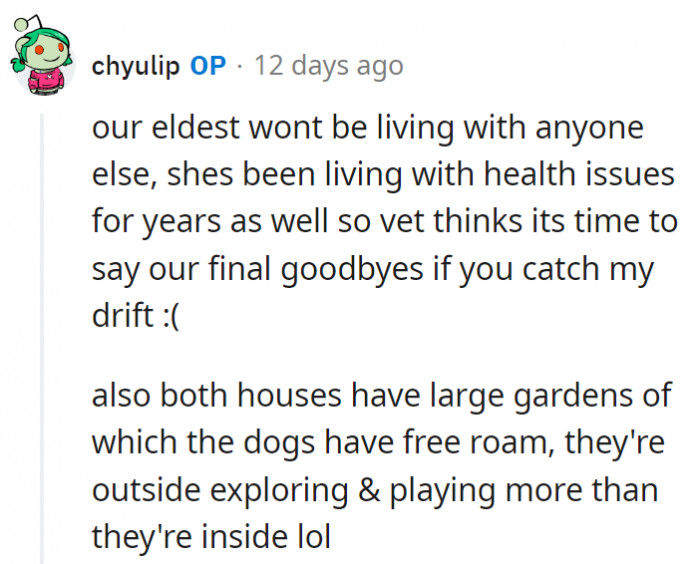
8. Some people are also advising OP to get a dog walker instead of paying for her to go to the dog park.

Despite all of OP's brother's reasons, it's pretty clear that OP is doing her best to make sure that her dog is well taken care of. It may be in unconventional ways since she can't do a lot of those things herself, but she still does it and seems to be willing to continue doing it.
With that, we don't think there's any problem at all, especially since she'll also be moving out into her own place soon. Hopefully, her brother can see OP's points, especially given that her dog also seems like an emotional support dog to her.
Psychological Analysis
This scenario highlights the emotional challenges surrounding pet ownership in family dynamics. The young woman's attachment to her dog may complicate discussions about rehoming, revealing deeper emotional needs that should be addressed. It's essential for families to communicate openly about these feelings to prevent distress and maintain healthy relationships.
Analysis generated by AI
Analysis & Alternative Approaches
Understanding the emotional complexities of pet ownership can illuminate the challenges families face when making difficult decisions. By fostering open communication and exploring compromise, families can navigate these conversations more effectively. Research underscores the importance of addressing emotional needs to strengthen family bonds and ensure that all members feel valued.



